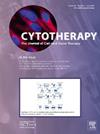Robust differentiation and potent immunomodulation of human mesenchymal stromal cells cultured with a xeno-free GMP protein supplement
IF 3.7
3区 医学
Q2 BIOTECHNOLOGY & APPLIED MICROBIOLOGY
引用次数: 0
Abstract
Background/Aims
Human mesenchymal stromal cells (hMSC) are multipotent adult cells commonly used in regenerative medicine as advanced therapy medicinal products. The expansion of these cells in xeno-free supplements is highly encouraged by regulatory agencies due to safety concerns. However, the number of supplements with robust performance and consistency for hMSC expansion are limited. Here, we evaluate a xeno-free human plasma-derived protein supplement (Plastem, Grifols) for the expansion and functional evaluation of hMSCs.
Methods
hMSC from bone marrow, adipose tissue and umbilical cord were obtained from two suppliers and cultured in Dulbecco's modified Eagle's medium (DMEM/F-12) supplemented with fetal bovine serum 10% (FBS), human platelet lysate 5% (hPL) or Plastem 10%+ hPL0.5%. Cell proliferation was evaluated after culturing hMSC for 13 days with trypan blue exclusion. hMSC immunophenotype was assessed by flow cytometry of surface markers expression. Multipotentiality assay determined the ability of hMSC to differentiate into osteogenic, chondrogenic and adipogenic lineages after 21 days, by using specific staining. Immunomodulatory properties of hMSC were analyzed by measuring suppression of human peripheral blood mononuclear cell (PBMC) proliferation in co-culture with hMSC.
Results
Plastem 10% + hPL 0.5% supported robust and sustained hMSC growth with a similar efficiency to the reference supplement FBS 10%. hMSC cultured with the xeno-free supplement presented a similar morphology comparable to FBS-supplemented cells and maintained typical expression of markers: positive (>95%) for CD90, CD73 and CD105; and negative (<5%) for CD45, CD14, CD19, CD34 and HLA-DR. Likewise, hMSC showed potent, in vitro differentiation potential into osteogenic, chondrogenic and adipogenic lineages, outperforming the results obtained with traditional reference supplements in several instances. They retained their immunomodulatory properties, inhibiting the proliferation of phytohemagglutinin (PHA)-stimulated PBMCs with a notable enhancement of the immunomodulatory capacity of hMSCs compared to conventional reference supplements.
Conclusions
Plastem allowed hMSC expansion while preserving phenotype and showed remarkable differentiation and immunomodulatory properties, supporting its use for cell therapy manufacturing processes as a robust, xeno-free alternative to FBS and hPL. Moreover, Plastem can be manufactured at an industrial level, making it a scalable solution for widespread application.
求助全文
约1分钟内获得全文
求助全文
来源期刊

Cytotherapy
医学-生物工程与应用微生物
CiteScore
6.30
自引率
4.40%
发文量
683
审稿时长
49 days
期刊介绍:
The journal brings readers the latest developments in the fast moving field of cellular therapy in man. This includes cell therapy for cancer, immune disorders, inherited diseases, tissue repair and regenerative medicine. The journal covers the science, translational development and treatment with variety of cell types including hematopoietic stem cells, immune cells (dendritic cells, NK, cells, T cells, antigen presenting cells) mesenchymal stromal cells, adipose cells, nerve, muscle, vascular and endothelial cells, and induced pluripotential stem cells. We also welcome manuscripts on subcellular derivatives such as exosomes. A specific focus is on translational research that brings cell therapy to the clinic. Cytotherapy publishes original papers, reviews, position papers editorials, commentaries and letters to the editor. We welcome "Protocols in Cytotherapy" bringing standard operating procedure for production specific cell types for clinical use within the reach of the readership.
 求助内容:
求助内容: 应助结果提醒方式:
应助结果提醒方式:


